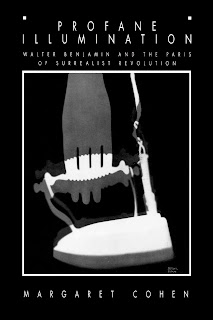Summary of Chapter 1: Gothic Marxism
Cohen introduces the concept of Gothic Marxism, by which she refers to “a Marxist genealogy fascinated with the irrational aspects of social processes, a genealogy that both investigates how the irrational pervades existing society and dreams of using it to effect social change” (1-2). Her two primary interlocutors for the study will be Walter Benjamin and Andre Breton, both of whom struggled with the economic determinism of the “vulgar Marxism” of their day; Breton developed a “modern materialism” which, Cohen argues, influenced Benjamin in his great unfinished Arcades Project, and in his work of bringing Freud into a Marxist vision.
Cohen appears fond of long numbered lists, for instance she summarizes Breton’s influence on Benjamin thus:
We will see Benjamin particularly provoked by (1) the modern materialist appeal to the fissured subject of psychoanalysis to modify the conscious and rational subject dear to practical Marxism; (2) its application of psychoanalytic notions of history to collective history in order to displace a linear or mechanically causal vision of historical process and to break down the base superstructure distinction with appeal to libidinal forces permeating both; (3) its use of psychoanalytic formulations of determination and representation to complicate a reflective model for the relation between superstructure and base; (4) its psychoanalytically informed interest in the everyday, which it uses to revise orthodox Marxist notions of the stuff of history as well as to open possible reservoirs for recuperative experience in damaged life; and (5) its application of psychoanalytic notions of therapy to an Enlightenment view of critique, notably as this application pertains to the dialectical image (p. 6).
She notes past scholarship on the connections between Benjamin’s Arcades Project and surrealism; this has normally been interpreted as Benjamin importing surrealist influence into Marxist analysis:
In the standard Marxist readings of this relation, informed by the Marxism either of the Frankfurt School or of Brecht, Benjamin's use of psychoanalytic language, notably dream language, has been considered the place where he substitutes the smoke and mirrors of writerly technique for critical analysis. (8)
Breton, in turn, has been dismissed by mainstream Marxists as "lacking in seriousness.” C situates this in relation to the contest between “high surrealism” (Breton) and “renegade surrealists” (Bataille), with the latter being the ones favored by later theorists. She discusses the relation with, and the debt owed to, the surrealists such as Breton, by the later “theoretical avant-garde” of Lacan, et al., who dismissed Breton and the high surrealists. A lot of the rejection by the subsequent generation can be seen as a reaction to the dominance of surrealism for a time: “With the aging of the generation tyrannized by high surrealism, official recognition of the movement is returning” (12n33).
She situates her project as a form of what Benjamin called “rescuing critique,” that is, a critique that rescues elements of the past through an understanding of their resonance with the presence, but which, by remaining “critique,” does not devolve into nostalgia. She gives another list of the rescued material with which a Gothic Marxism will be interested:
The most suggestive material rescued here includes: (1) the valorization of the realm of a culture’s ghosts and phantasms as a significant and rich field of social production rather than a mirage to be dispelled; (2) the valorization of a culture’s detritus and trivia as well as its strange and marginal practices; (3) a notion of critique moving beyond logical argument and the binary opposition to a phantasmagorical staging more closely resembling psychoanalytic therapy, privileging nonrational forms of “working through” and regulated by overdetermination rather than dialectics; (4) a dehierarchization of the epistemological privilege accorded the visual in the direction of that integration of the senses dreamed of by Marx in The 1844 Manuscripts: “. . . the complete emancipation of all human senses and qualities . . . The senses have therefore become directly in their practice theoreticians” ; accompanying this dehierarchization, a practice of criticism cutting across traditionally separated media and genres as well as critical attention to how and why these separations came to be; and (5) a concomitant valorization of the sensuousness of the visual: the realm of visual experience is opened to other possibilities than the accomplishment and/or figuration of rational demonstration. (11-12)
To summarize the above:
1) a culture’s “ghosts and phantasms” are not just a mirage, but a “field of social production;”
2) ditto for a culture’s “detritus and trivia,” likewise not to be consigned to the dustbin;
3) moving beyond critique as a form of argument and opposition to something more like psychoanalytical therapy [this feels very 90s];
4) replacing the privilege of the visual with an integration of all the senses; and
5) at the same time, valorizing the “sensuousness of the visual” as more than just a stand-in for “rational demonstration.”
She notes that she will be linking up to the Gothic Marxism of later French avant-garde thinkers, including Deleuze and Guattari, Michel de Certeau, and particularly Louis Althusser, and concludes with a note on Benjamin’s concept of “fascination” (15), which seems related to the Aristotelian concept of wonder; she quotes Ackbar Abbas, stating that Benjamin “sees in fascination not a will-less affect, not the response of last resort, but a willingness to be drawn to phenomena that attract our attention yet do not submit entirely to our understanding.” This sounds very much like the sensibility of the "modern hero" in Benjamin's Baudelaire book.

No comments:
Post a Comment